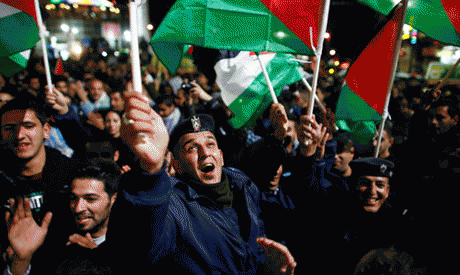What actually happened on November 29, 1947? On that day the U.N. General Assembly decided to partition Palestine into two states, one Arab and one Jewish, and to internationalize Jerusalem. In a rare instant of unity, the United States and the Soviet Union voted for it. So did for example, Iceland, Costa-Rica and New Zealand. However, all the states bordering Palestine voted against the resolution, since it went against the will of the majority of the country's population and of the entire region -- a sure recipe for chronic violence. The recent bloodshed in Gaza is just the most recent episode of that never-ending tragedy.
But most Zionists at that time viewed the U.N. vote as a resounding victory for their movement. They had long pursued the policy of separate development, rather than one of integration within the society then existing in Palestine. The U.N. assigned to a future Zionist state 55 percent of the country, in which Jews -- Zionists, non-Zionists and anti-Zionists -- constituted at the time about one third of the population, and where they owned 7 percent of the land.
Since 1947, the Zionists have tried to occupy "the maximum of land with a minimum of Arabs." Hundreds of thousands of Arabs were evicted or terrorized to leave their homes in 1947-49. The Israeli army has since established control over the entire Palestine of 1947, i.e., the territory between the Jordan River and the Mediterranean. However, Jews once again find themselves in a minority in that territory, which is tightly segregated from the majority Arab population.
When in November 1917, the British government approved the idea of a Jewish homeland in Palestine, one of the most prominent British Jewish politicians, Edwin Montagu, strenuously objected, ridiculing the idea that followers of Judaism in different countries belonged to a separate nation. In fact, Jews in Western countries, despite what they profess to be their attachment to Israel, have not migrated to Israel in any significant numbers. The opposite is true: there are many more Israelis living in the United States and Canada than American and Canadian Jews living in Israel.
Rather than providing a safe haven, Israel has become a dangerous place for Jews. Many different people warned about this outcome. Hannah Arendt, a German refugee in New York and a Zionist intellectual wrote at the time:
"And even if the Jews were to win the war ... the 'victorious' Jews would live surrounded by an entirely hostile Arab population, secluded inside ever-threatened borders, absorbed with physical self-defense. [...] And all this would be the fate of a nation that -- no matter how many immigrants it could still absorb and how far it extended its boundaries ... would still remain a very small people greatly outnumbered by hostile neighbors."
Her words were echoed by the anti-Zionist Rabbi Amram Blau, who accused the Zionists of having little respect for human life: "... they have proven to be irresponsible, extended their rule over parts of the Holy Land, which had been inhabited by Arabs, and thereupon brought the entire Arab world into conflict with the Jewish community."
There is no other issue that divides Jews as sharply as the question of Israel. Unlike the Jews, Christian Zionists, many times more numerous than the entire Jewish population of the world, are united and constitute the most powerful pro-Israel force in the United States.
The recent conflagration confirms that the militarily superior Israel can rely on political impunity, ignore U.N. resolutions, but it cannot bring peace to the long suffering country. The United Nations, which made all this possible in 1947, has little to celebrate.
Yakov M. Rabkin is professor of history at the University of Montreal. His most recent book A Threat from Within: A Century of Jewish Opposition to Zionism (Zedbooks/Palgrave Macmillan) has been published in twelve languages.





